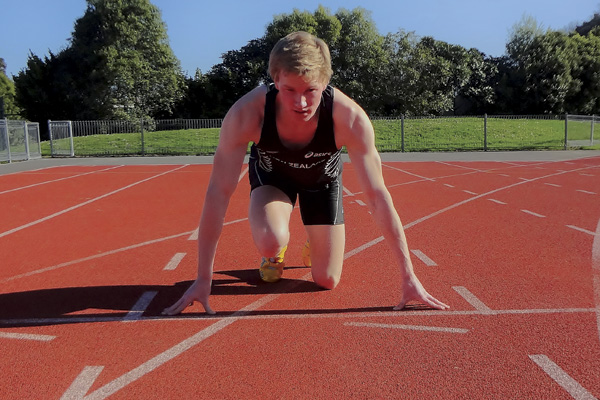Whyte Men Can Run
Andrew Whyte is the fastest man over 400 metres in New Zealand. In 2012, straight after 10 weeks off with a stress fracture in his shin, Andrew was fast enough to come third in his semi-final at the World Junior Athletics Champs, a race won by eventual London silver medallist Luguelin Santos. Last week he added the Open Menís New Zealand 400m title to his previous Junior title, as well as a second in the 200m. Otago Universityís Andrew Whyte is one of the fastest blokes in the country.
You would imagine that to get to this point Andrew would have progressed smoothly through the age group ranks, but it hasnít really been like that. ďIíve only been competing seriously for 18 months. I stopped doing Athletics when I was 13 and then took it up again towards the end of seventh form. It was injuries that stopped me and also that I lived on a farm, so there were no real training facilities. I also had Severís disease, which causes your heels to fuse together a bit while youíre growing. Once I got older I wanted to give running another try and see if I was still quick.Ē
Without many people outside athletics noticing, Andrew has quietly become one of New Zealandís most promising young athletes. ďAt the moment I am level two carded. That means the only people receiving more funding than me in athletics are athletes like Valerie Adams. I am also on the Prime Ministerís scholarship which pays for my university.Ē
Despite scholarship offers from prestigious US colleges such as UCLA and Florida State, Andrew decided to stay in New Zealand. ďI thought Iíd be better to stay here if I wanted to make it to the Olympics. I seriously thought about it, but I donít really like the idea of running Ďforí a university. They want you to run every week even if you donít want to. Over here Iím not obligated to do anything if I donít want to.Ē
It is tough to find regular high-class competition in New Zealand. ďThere arenít many serious events. There are the [NZ] Nationals but you have to go to Aussie for events. They have a circuit with five big races. Iíve been injured so didnít go last year, but Iíll go this year in April. Itís a lot better to go to Europe. There you can have three or four big races in a row rather than just a one-off.Ē
The long-term goal is the Rio Olympics in 2016, with the Commonwealth Games in Glasgow next year a stepping-stone on the way. Andrew will be 22 when Rio comes around, just entering his prime as a sprinter. Until then a steady diet of physio, massage and training with the Hill City club are all Andrew has time for when heís not working on his Commerce degree.




